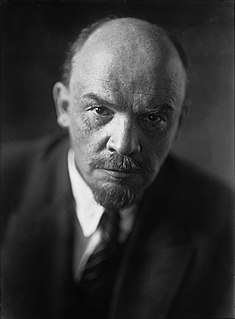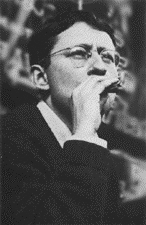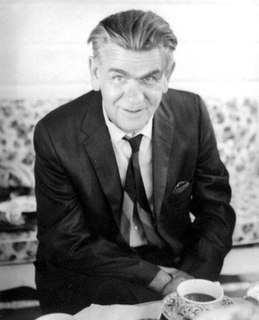
Leninism is a political ideology developed by Russian Marxist revolutionary Vladimir Lenin that proposes the establishment of the dictatorship of the proletariat led by a revolutionary vanguard party, as the political prelude to the establishment of communism. The function of the Leninist vanguard party is to provide the working classes with the political consciousness and revolutionary leadership necessary to depose capitalism in the Russian Empire (1721–1917). Leninist revolutionary leadership is based upon The Communist Manifesto (1848) identifying the communist party as "the most advanced and resolute section of the working class parties of every country; that section which pushes forward all others." As the vanguard party, the Bolsheviks viewed history through the theoretical framework of dialectical materialism, which sanctioned political commitment to the successful overthrow of capitalism, and then to instituting socialism; and, as the revolutionary national government, to realize the socio-economic transition by all means.
The Situationist International (SI) was an international organization of social revolutionaries made up of avant-garde artists, intellectuals, and political theorists. It was prominent in Europe from its formation in 1957 to its dissolution in 1972. The intellectual foundations of the Situationist International were derived primarily from libertarian Marxism and the avant-garde art movements of the early 20th century, particularly Dada and Surrealism. Overall, situationist theory represented an attempt to synthesize this diverse field of theoretical disciplines into a modern and comprehensive critique of mid-20th century advanced capitalism.

Guy Louis Debord was a French Marxist theorist, philosopher, filmmaker, critic of work, member of the Letterist International, founder of a Letterist faction, and founding member of the Situationist International. He was also briefly a member of Socialisme ou Barbarie.

Amadeo Bordiga was an Italian Marxist, a contributor to communist theory, the founder of the Communist Party of Italy (PCd'I), a member of the Communist International (Comintern) and later a leading figure of the International Communist Party. Bordiga was originally associated with the PCd'I, but he was expelled in 1930 after being accused of Trotskyism.

The Communist International (Comintern), also known as the Third International, was an international organization founded in 1919 that advocated world communism, headed by the Soviet Union. The Comintern resolved at its Second Congress to "struggle by all available means, including armed force, for the overthrow of the international bourgeoisie and the creation of an international Soviet republic as a transition stage to the complete abolition of the state". The Comintern was preceded by the 1916 dissolution of the Second International.

Council communism is a current of communist thought that emerged in the 1920s. Inspired by the November Revolution, council communism was opposed to state socialism and advocated workers' councils and council democracy. Strong in Germany and the Netherlands during the 1920s, council communism continues to exist as a small minority in the left.

Paul Mattick Sr. was a German-American Marxist political writer and social revolutionary, whose thought can be placed within the council communist and left communist traditions.
The term ultra-leftism, when used among Marxist groups, is a pejorative for certain types of positions on the far-left that are extreme or uncompromising. Another definition historically refers to a particular current of Marxist communism, where the Comintern rejected social democratic parties and all other progressive groupings outside of the Communist Party.

The Communist Workers' Party of Germany was an anti-parliamentarian and left communist party that was active in Germany during the time of the Weimar Republic. It was founded in April 1920 in Heidelberg as a split from the Communist Party of Germany (KPD). Originally the party remained a "sympathising member of Communist International." In 1922 the KAPD split into two factions, both of whom kept the name but are referred to as the KAPD Essen Faction and the KAPD Berlin Faction.

The Communist Workers' International or Fourth Communist International was a council communist international. It was founded around the Manifesto of the Fourth Communist International, published by the Communist Workers' Party of Germany (KAPD) in 1921.

Libertarian Marxism is a broad scope of economic and political philosophies that emphasize the anti-authoritarian and libertarian aspects of Marxism. Early currents of libertarian Marxism such as left communism emerged in opposition to Marxism–Leninism.

Communization mainly refers to a contemporary communist theory in which there is a mixing-up of insurrectionist anarchism, the communist ultra-left, post-autonomists, anti-political currents, groups like the Invisible Committee, as well as more explicitly ‘communizing’ currents, such as Théorie Communiste. "Obviously at the heart of the word is communism and, as the shift to communization suggests, communism as a particular activity and process..." It is important to note the big differences in perception and usage. Some groups start out from an activist voluntarism, while others derive communization as an historical and social result emerging out of capital's development over the last decades. Endnotes totally distinguishes itself from the mixing of all sorts of meanings of the word communization and explicitly refers to the different reception in the Anglophone world as opposed to the original French milieu from which it emerged as a critique.

Gilles Dauvé is a French political theorist, school teacher, and translator associated with left communism and the contemporary tendency of communization.
Communism is a philosophical, social, political, and economic ideology and movement whose goal is the establishment of a communist society, namely a socioeconomic order structured upon the ideas of common or social ownership of all property and the absence of social classes, money, and the state. Communism is a specific, yet distinct, form of socialism. Communists agree on the withering away of the state but disagree on the means to this end, reflecting a distinction between a more libertarian approach of communization, revolutionary spontaneity, and workers' self-management, and a more vanguardist or Communist party-driven approach through the development of a constitutional socialist state.

International Socialists of Germany was the name of a political party, formed in September 1915, which split from the Social Democratic Party of Germany, following the latter's decision to support the German war effort in World War I. The ISD consisted of members who were on the left wing of the SPD. The party changed its name to the International Communists of Germany (IKD) in 1918 and most of members of the IKD joined the Communist Party of Germany in 1918, but later went on to form the council communist Communist Workers' Party of Germany.

Left communism, or the communist left, is a position held by the left wing of communism, which criticises the political ideas and practices espoused by Marxist–Leninists and social democrats. Left communists assert positions which they regard as more authentically Marxist than the views of Marxism–Leninism espoused by the Communist International after its Bolshevization by Joseph Stalin and during its second congress.

Socialisme ou Barbarie was a French-based radical libertarian socialist group of the post-World War II period whose name comes from a phrase which was misattributed to Friedrich Engels by Rosa Luxemburg in The Junius Pamphlet, but which probably was most likely first used by Karl Kautsky. It existed from 1948 until 1967. The animating personality was Cornelius Castoriadis, also known as Pierre Chaulieu or Paul Cardan. Socialisme ou Barbarie is also the name of the group's journal.

Western Marxism is a current of Marxist theory that arose from Western and Central Europe in the aftermath of the 1917 October Revolution in Russia and the ascent of Leninism. The term denotes a loose collection of theorists who advanced an interpretation of Marxism distinct from both classical and Orthodox Marxism and the Marxism-Leninism of the Soviet Union.

The following outline is provided as an overview of and topical guide to Marxism:










